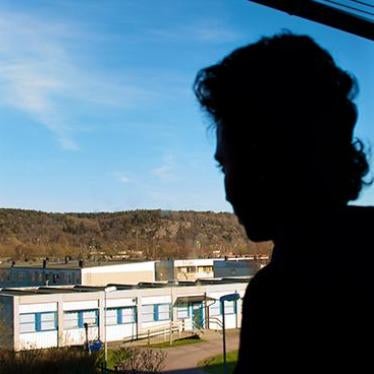I met Tabish P. on a cold day in February at the group home where he lives in Gothenburg. A 16-year-old asylum seeker from Afghanistan, Tabish told me that if he could speak to the Swedish government, he would tell them he is happy here.
Tabish is one of the 35,369 unaccompanied children who sought asylum in Sweden in 2015. In a new report, published today, Human Rights Watch documents delays and difficulties these children face in getting critical care and support. The report is based on research in seven municipalities, including interviews with 50 unaccompanied children as well as with service providers and local officials.
The report recognizes Sweden’s leadership in providing sanctuary to children in need of protection. However, imperfections in the system mean children are not always getting the care they need and to which they are entitled under both international standards and Swedish law and policy. The report documents shortcomings in mental and physical health care, the processing of asylum claims, the guardianship system, and housing. Sweden can and should do more to ensure children are not falling through the cracks.
Many of the 50 children we interviewed had fled countries like Afghanistan and Syria, where they faced conflict, persecution, and hardship, and traveled on their own to Sweden or became separated from their families in transit. Significant numbers experienced further traumas during their journey, including violence at the hands of smugglers and abusive authorities.
Many told me they came to Sweden seeking safety and, like Wafa U., a 15-year-old Afghan boy, “a brighter future.” Children also said they feel welcome in Sweden. Omid W., a 16-year-old asylum seeker from Afghanistan who had been in the country for 10 months, told me “It feels like Sweden is home.”
I can understand why children feel relief here. Sweden has long been a global leader in providing sanctuary to people who need protection. In many countries, Human Rights Watch has documented the detention and abuse of migrant children, and found children locked up in overcrowded detention centers where they are subject to degrading treatment. In Sweden, we met children living in dedicated group homes and learned about laws and practices that guarantee equal access to schools and health care.
Over the past year, people in Sweden have mobilized to welcome new arrivals. We talked with local officials, volunteers, foster parents, service providers and others. Their commitment to the well-being of these particularly vulnerable children is commendable.
But some of the children we met, including those who had experienced abuse and sexual violence, are not receiving adequate mental and physical health care. Though under the Swedish framework, unaccompanied children should receive a health screening and a meeting with social services, I spoke with some who had gone months without either. Inappropriate housing arrangements—such as placing lone girls in group homes with boys and repeated, disruptive relocations—had a profound effect on some of the children we interviewed. Our interviews also raised concerns that girls who experience gender-based violence may not be identified or referred for critical services.
International standards call for prioritizing asylum claims by children, but Sweden doesn’t. With the general backlog of asylum applications, most of the children who arrived last year face an agonizing wait for a decision about their future. Extended periods of insecurity can have a particularly harmful effect on children’s mental health.
Children also experienced long delays in the appointment of legal guardians. Guardians are responsible for looking after a child’s best interest and act as a link between the child and the Swedish bureaucracy. Delays meant children had trouble getting information, support, and education.
When we spoke, Tabish had been in Sweden for four months, but had no legal guardian and had yet to visit a doctor for a health screening or meet with a social worker. He told me he thinks about Afghanistan and feels worried and sad, but that he cannot speak with the staff at his group home about his feelings because of the language barrier. Still, he said “I don’t want to complain about it.” He said that he and other asylum seekers just want to “live here like human beings.”
The good news is, these shortcomings can be addressed. The government has already taken steps to understand and improve the situation, including beginning an analysis of the social services provided to unaccompanied children. The national government should enact common sense reforms to ensure children have better access to their rights. The collection of key data on health care and social services, housing, school enrollment and guardianship appointments would help identify gaps and guide policymaking.
Municipalities need increased support through training, guidelines, and improved regulations to help them fulfill their responsibilities. The Migration Agency should begin making applications from unaccompanied children a priority. Municipalities should also take steps now to address issues with housing, health care, social services, and guardianship arrangements for unaccompanied children.
Sweden can continue to be a model for other countries. This week, teenagers graduating from high school will sing a traditional song about the promise of a bright future. By enacting key reforms and improving oversight and support, Sweden can ensure that all children—including children like Tabish and Wafa—enjoy a bright future.








